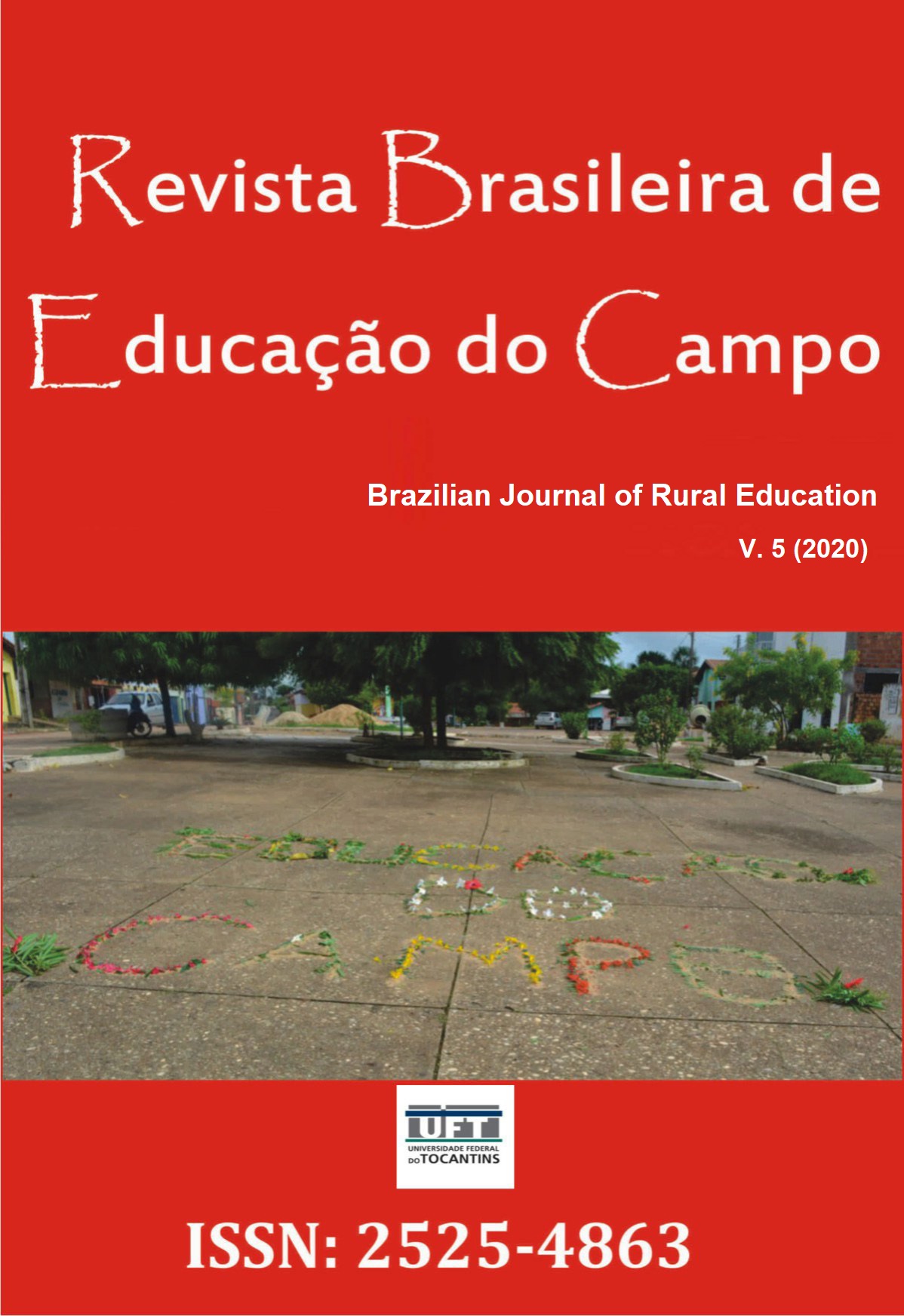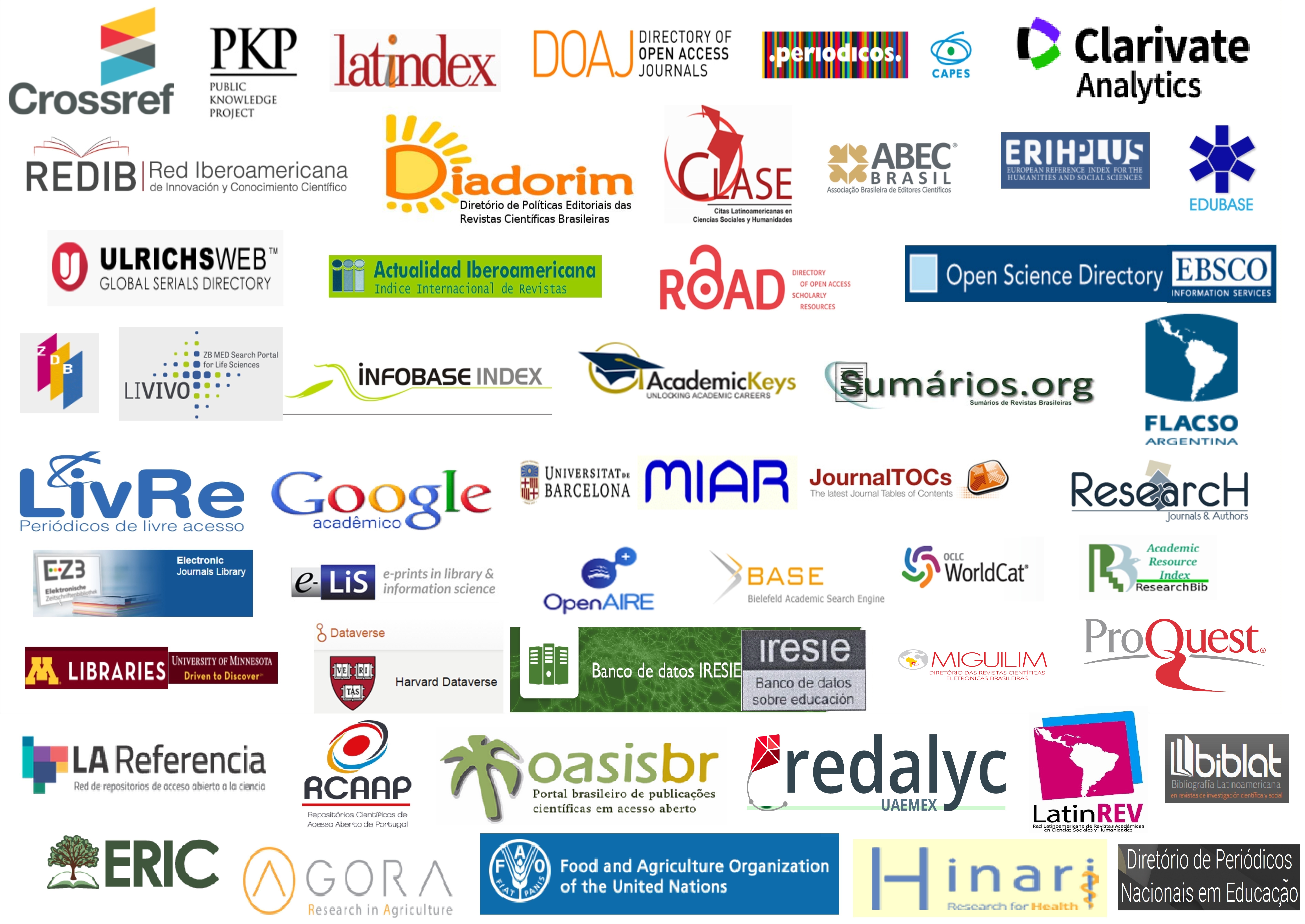Contribuição das feiras orgânicas de Porto Alegre na Formação de Licenciandas e Licenciandos em Educação do Campo
DOI:
https://doi.org/10.20873/uft.rbec.e7165Resumo
O presente artigo se propõe a compreender de que modo o entendimento dos processos inerentes à institucionalização e funcionamento das feiras orgânicas pode contribuir na formação da Licencianda e do Licenciando em Educação do Campo-Ciências da Natureza. Da mesma maneira, busca-se analisar, a partir do diálogo com diferentes sujeitos representantes das feiras orgânicas de Porto Alegre-RS, que aspectos a Licencianda e o Licenciando em Educação do Campo precisaria desenvolver para contribuir na gestão de processos comunitários de feiras orgânicas locais nas comunidades em que atuam. A análise das entrevistas foi realizada com auxílio metodológico da Análise Textual Discursiva (ATD). Os resultados apontam as Feiras Orgânicas como um espaço de estudo importante, apresentando diversas possibilidades formativas. Ressalta-se a necessidade das feiras serem mais abordadas na formação de educadoras e educadores do campo, tanto como um instrumento de pesquisa, quanto de ensino e extensão, contribuindo assim para um melhor entendimento do universo de trabalho dos povos do campo, entre eles os sujeitos da agricultura familiar.
Palavras-chave: Formação de professores, Educação do Campo, Feiras Orgânicas, Ensino de Ciências.
Contribution of Porto Alegre’s fairs in the formation of the Licensing in Rural Education
ABSTRACT. This article intends to understand how the understanding of the processes inherent to the institutionalization and functioning of organic fairs can contribute to the training of the licencing in Rural Education - Science of Nature. In the same way, it is sought to analyze, from the dialogue with different subjects representatives of the organic fairs of Porto Alegre-RS, what aspects the licencing in Rural Education would need to develop to contribute in the management of community processes of organic fairs communities in which they operate. The analysis of the interviews was carried out with methodological aid of the Discursive Textual Analysis (ATD). The results point to the Organic Fairs as an important study space, presenting several formative possibilities. It is important to highlight the need for the fairs to be more approached in the formation of the educator of the field, as a research instrument, as well as teaching and extension, thus contributing to a better understanding of the work universe of the rural people, among them the subjects of agriculture family.
Keywords: Teacher Training, Rural Education, Organic Fairs, Science Education.
Contribución de las ferias orgánicas de Porto Alegre en la formación de la Licencia en Educación de Campo
RESUMEN. El presente artículo se propone comprender de qué modo el entendimiento de los procesos inherentes a la institucionalización y funcionamiento de las ferias orgánicas puede contribuir en la formación del Licenciamiento en Educación del Campo-Ciencias de la Naturaleza. De la misma manera, se busca analizar, a partir del diálogo con diferentes sujetos representantes de las ferias orgánicas de Porto Alegre-RS, qué aspectos el licenciando en Educación del Campo necesitaría desarrollar para contribuir en la gestión de procesos comunitarios de ferias orgánicas locales en las comunidades en las que actúan. El análisis de las entrevistas fue realizado con ayuda metodológica del análisis textual discursivo (ATD). Los resultados apuntan a las Ferias Orgánicas como un espacio de estudio importante, presentando diversas posibilidades formativas. Se resalta la necesidad de que las ferias sean más abordadas en la formación del educador del campo, tanto como un instrumento de investigación, como de enseñanza y extensión, contribuyendo así a un mejor entendimiento del universo de trabajo de los pueblos del campo, entre ellos los sujetos de la agricultura familiar.
Palabras clave: Formación de Profesores, Educación del Campo, Ferias Orgánicas, Enseñanza de Ciencias.
Downloads
Referências
Boechat, P. T., & Santos, J. L. (2011). Feira livre: questões sociais e relações identitárias. Anais do VIII Encontro Baiano de Geografia, Universidade do Estado da Bahia.
Bruil, J. (2014). Pelo fortalecimento da agricultura familiar, camponesa e indígena: recomendações do ano internacional da agricultura familiar. Revista Agriculturas: Experiências em Agroecologia, 11(3), 33-37.
Brasil. (2006). Lei Orgânica de Segurança Alimentar Nutricional (Losan). Lei nº 11.346, de 15 de setembro de 2006. Cria o Sistema Nacional de Segurança Alimentar e Nutricional-SISAN com vistas em assegurar o direito humano à alimentação adequada e dá outras providências. Diário Oficial da União 2006; 18 set. Recuperado de: http://www.planalto.gov.br/ccivil_03/_ato2004-2006/2006/lei/l11346.htm.
Buainain, A. M., & Batalha, M. O. (2007). Cadeia Produtiva de Produtos Orgânicos. MAPA/SPA, Brasília, v. 5.
Castro, E. G. (2012). Juventude do Campo. In Caldart, R. S., Pereira, I. B., Alentejano, P., & e Frigotto, G. (Orgs.). Dicionário da Educação do Campo (pp. 437-444). Rio de Janeiro, São Paulo: Escola Politécnica de Saúde Joaquim Venâncio, Expressão Popular.
Cruz, F. T., & Menasche. R. (2011). Do consumo à produção: produtos locais, olhares cruzados. Revista IDeAS, 5(1), 91-114.
Dalla Nora, F., & Zanini, M. C. (2015). A feira como um espaço de sociabilidade. Revista Retratos de Assentamentos, 1, 135-154.
Darolt, M. R. (2012). Conexão Ecológica: novas relações entre agricultores e consumidores. Londrina: IAPAR.
Darolt, M. R., Lamine. C., & Brandemburg, A. (2013). A diversidade dos circuitos curtos de alimentos ecológicos: ensinamentos do caso brasileiro e francês. Agriculturas, 10(2), 8-13.
Deus, V. C., Oliveira, J. C. C., Silva, A. A., Santos, E. S., & Oliveira, A. C. (2015). Proposta de espaço não formal para o ensino de ciências em Rorainópolis Roraima. Anais do X Encontro Nacional de Pesquisa em Educação em Ciências. Águas de Lindoia/SP.
Dreier, C., & Verdum, R. (2017). Construção da paisagem na produção alternativa dos integrantes da Feira dos Agricultores Ecologistas (FAE) de Porto Alegre. Dinâmicas do espaço agrário: velhos e novos territórios: NEAG 10 anos (pp. 127-152). Porto Alegre: Evangraf.
Fonseca, K. N., Milli, J. C. L., Bomfim, M. G., Almeida, E. S., Neres, C. A., & Gehlen, S. T. (2018). A feira livre como tema gerador: possibilidades de abordar física no Ensino Fundamental. Física na Escola, 16(2), 62-67.
Lamine, C. (2012). Changer de système: une analyse des transitions vers l’agriculture biologique à l’echelle des systèmes agri-alimentaires territoriaux. Terrains et Travaux, 20, 139-156. https://doi.org/10.3917/tt.020.0139
Lüdke, M., & André, M. E. D. A. (2013). A Pesquisa em educação: abordagens qualitativas. 2 ed. Rio de Janeiro: E.P.U.
Nascimento, J. C. (2012). Consciência ambiental, hábitos e expectativas de consumidores de feira ecológica de Porto Alegre (Trabalho de Conclusão de Curso). Universidade Federal do Rio Grande do Sul, Porto Alegre.
Nobre, M. (1998). Gênero e Agricultura Familiar. Revista Cadernos Sempre Viva: Série Gênero, Políticas Públicas e Cidadania. São Paulo: SOF, 2.
Silva, G. (no prelo). Origem dos produtores orgânicos que participam das feiras em Porto Alegre.
Silva, B. J. (2015). Circuitos curtos de comercialização de alimentos orgânicos: emancipação socioeconômica na agricultura familiar? (Dissertação de Mestrado). Universidade Federal de Santa Catarina, Florianópolis.
Tardin, J. M. (2012). Cultura Camponesa. In Caldart, R. S., Pereira, I. B., Alentejano, P., & e Frigotto, G. (Orgs.). Dicionário da Educação do Campo (pp. 178-186). Rio de Janeiro, São Paulo: Escola Politécnica de Saúde Joaquim Venâncio, Expressão Popular.
UFRGS. (2013). Projeto Pedagógico da Licenciatura em Educação do Campo: Ciências da Natureza. Universidade Federal do Rio Grande do Sul.
Valent, J. Z., Tisott, S. T., Schmidt, V., & Valent, V. D. (2014). Qualidade de produtos orgânicos: a percepção dos produtores de hortaliças de uma feira ecológica em Porto Alegre – RS. Revista Eletrônica em Gestão, Educação e Tecnologia Ambiental – REGET, 18(1) 1072-1082. https://doi.org/10.5902/2236117013839
Publicado
Como Citar
Edição
Seção
Licença
Proposta de Aviso de Direito Autoral Creative Commons
1. Proposta de Política para Periódicos de Acesso Livre
Autores que publicam nesta revista concordam com os seguintes termos:
a. Autores mantém os direitos autorais e concedem à revista o direito de primeira publicação, com o trabalho simultaneamente licenciado sob a Licença Creative Commons Attribution que permite o compartilhamento do trabalho com reconhecimento da autoria e publicação inicial nesta revista.
b. Autores têm autorização para assumir contratos adicionais separadamente, para distribuição não-exclusiva da versão do trabalho publicada nesta revista (ex.: publicar em repositório institucional ou como capítulo de livro), com reconhecimento de autoria e publicação inicial nesta revista.
c. Autores têm permissão e são estimulados a publicar e distribuir seu trabalho online (ex.: em repositórios institucionais ou na sua página pessoal) a qualquer ponto antes ou durante o processo editorial, já que isso pode gerar alterações produtivas, bem como aumentar o impacto e a citação do trabalho publicado (Veja O Efeito do Acesso Livre).
Proposal for Copyright Notice Creative Commons
1. Policy Proposal to Open Access Journals
Authors who publish with this journal agree to the following terms:
A. Authors retain copyright and grant the journal right of first publication with the work simultaneously licensed under the Creative Commons Attribution License that allows sharing the work with recognition of its initial publication in this journal.
B. Authors are able to take on additional contracts separately, non-exclusive distribution of the version of the paper published in this journal (ex .: publish in institutional repository or as a book), with an acknowledgment of its initial publication in this journal.
C. Authors are permitted and encouraged to post their work online (eg .: in institutional repositories or on their website) at any point before or during the editorial process, as it can lead to productive exchanges, as well as increase the impact and the citation of published work (See the Effect of Open Access).














